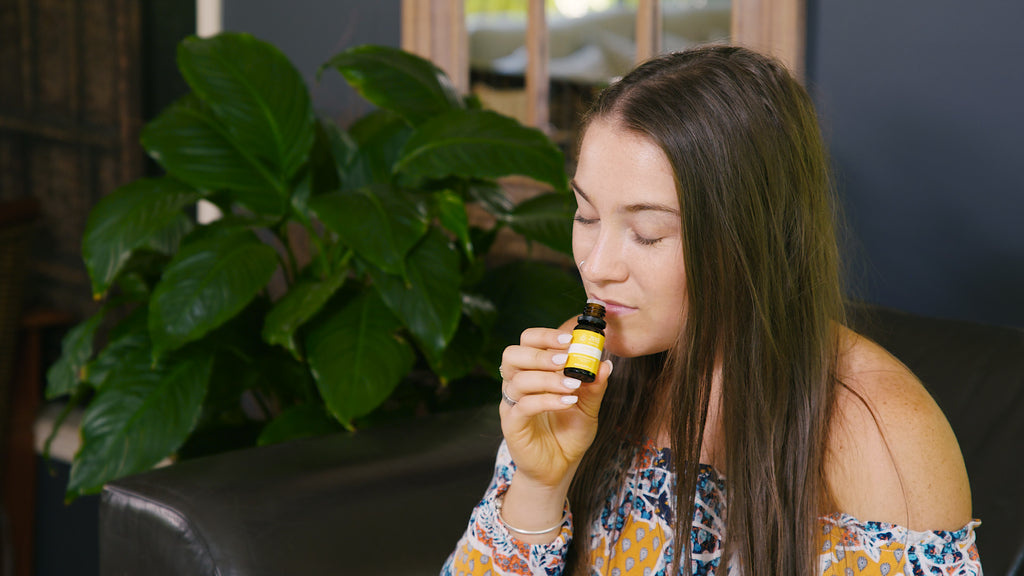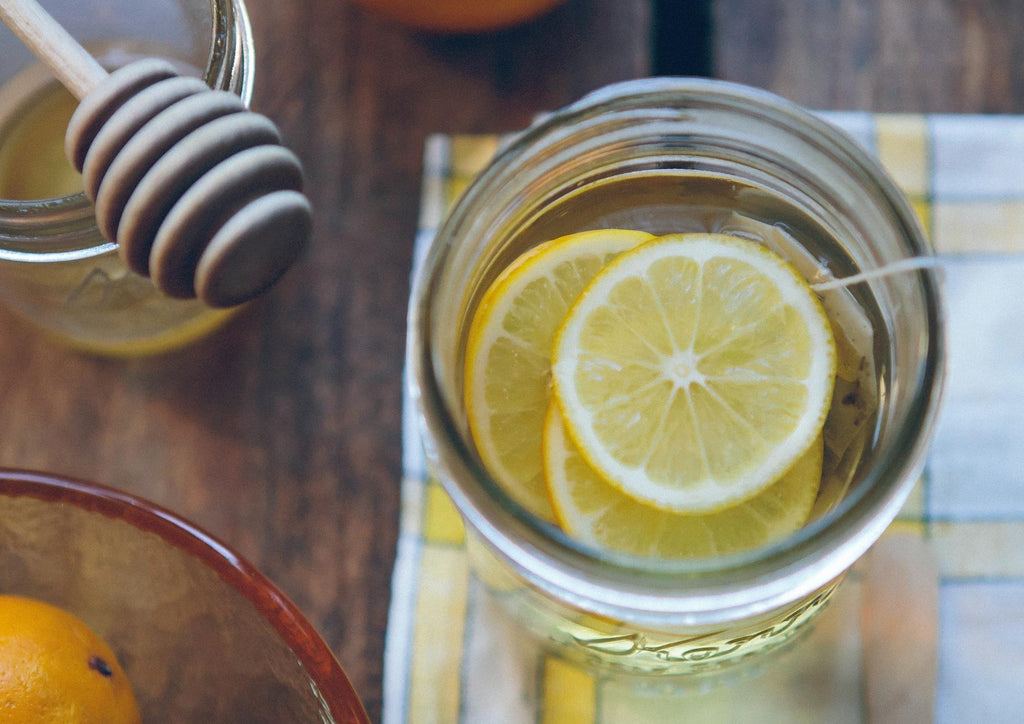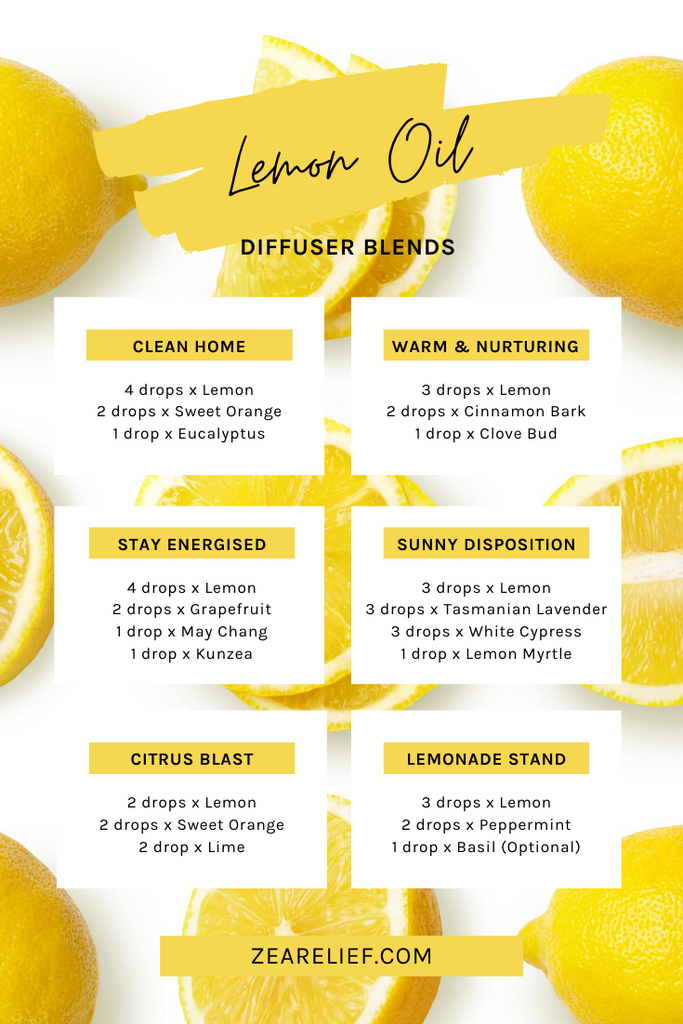Lemon is a fresh, invigorating, and cleansing citrus fruit that can help bring warmth, vitality, and energy into your life. Just like drinking warm water with the juice of half a freshly squeezed lemon first thing in the morning is a great way to aid digestion and boost immunity, diffusing Lemon Essential Oil in an aroma diffuser can assist with detoxifying and cleansing the body and soul.
Lemon Essential Oil is extracted through cold pressing the peel of the lemon fruit and is pale to deep yellow in colour. Its refreshing and clean aroma is great for DIY natural cleaning products and for promoting an elevated mood and general wellbeing around the home and workplace.
About Lemon Oil
The origin of the lemon tree is unknown, however, it is believed to have first grown in Southeast Asia, primarily northeast India1. Over the centuries, the cultivation of lemon trees has expanded worldwide as the demand for lemons has grown for a variety of culinary and non-culinary uses. Christopher Columbus introduced lemons to the Americas in 1493, when he brought lemon seeds with him on his voyage to the New World, leading to the largest lemon industry by the twentieth century2.
Today, lemon’s are also cultivated in Australia. At Zea, we organically source Lemon Essential Oil from regional South Australia. It takes up to 3,000 lemons to produce a kilo of essential oil from the outer rind of the fruit3. Like many citrus essential oils, lemon has a sharp, fruity, zesty aroma.
As well as physical benefits, lemon essential oil can help to clear the cobwebs from the mind, put a spark back into your life, and allow progression without confusion.
Essential Oil Facts
Botanical name: Citrus limon
Common name: Lemon, Liquid Sunshine
Family: Rutaceae
Extraction method: Cold pressing the outer rind of the lemon
Note: Top
Strength of aroma: Strong
Aromatic scent: Zesty and fruity
Typical chemical constitution: alpha-pinene (1-4%), camphene (<0.1%), beta-pinene (6-15%), sabinene (1-5%), myrcene (1-2%), alpha-terpinene (<0.5%), linalool (<1%), beta-bisabolene (<1%), limonene (62-75%), trans-alpha-bergamotene (<0.4%), nerol (<0.05%), neral (0.8%)
Safety information: Sensitisation can occur in some people and it should not be used on the skin prior to exposure to the sun as it is phototoxic.
7 Uses of Lemon Oil
Lemon oil is a popular essential oil used for uplifting the emotions, cleansing the atmosphere and helping to detoxify the body. It’s high level of Limonene is the major constituent that reflects a lot of its uses and benefits.
In recent years, the medical literature has begun to reflect the therapeutic benefits of lemon essential oil that many traditional users have touted for centuries. Here are out favourite ways to use Lemon Essential Oil:
1. Concentration and Focus
Lemon Oil is particularly useful in aiding concentration, when the ability to focus is difficult - this may be due to depression, overwhelm or distraction. Lemon helps clear the mind without overstimulating, and can actually be very calming.
Fischer-Rizzi, author of the Complete Aromatherapy Handbook, describes it as the ‘rational oil’ and recommends it to aid in calm during emotional outbursts4.
During 2014, a small study of 4th grade students demonstrated improved performance on their exams when Lemon Oil was being diffused7.
Lemon - along with Bergamot, Basil, Kunzea and Grapefruit - is a key ingredient in our very own Mental Clarity Lifestyle Blend for aiding focus and concentration.

2. Memory and Brain Health
In addition to aiding concentration, lemon oil is also well traditionally used for aiding memory and cognitive function.
A clinical trial in Japan investigated the effects of essential oils in 28 elderly people, 17 who had alzheimers. In this particular study, lemon and rosemary oil were used in the morning and lavender and orange in the evening. The study demonstrated that aromatherapy was effective for dementia and may have some potential for improving cognitive function6.
Anecdotally, many nurses in aged care homes have witnessed improvements in cognitive function of elderly patients with memory loss after using the essential oils of lemon and May Chang in their diffusers.
There is the opportunity for a lot more research into the benefits of Lemon Oil for aiding cognitive function.
3. Acidity in the Body
Now, this suggested use of lemon is more so related to the use of fruit juice, rather than the essential oil, however I thought it was worth mentioning as it is still important.
Many people correctly assume that lemon is acidic, however, during the digestion process the citric acid is neutralised - giving rise to carbonates and bicarbonates of potassium and calcium3. This helps to maintain alkalinity of the system.
Peter Holmes, author of Aromatica, refers to Lemon as a restorative to the liver and recommends using it for liver congestion, toxicosis, headaches and arthritic conditions5.
Too much acidity in the body can lead to gastric ulcers and pain, but also to arthritic changes and gout whereby the body does not rid itself of uric acid and this forms crystals which causes inflammation in the joints3.
Start the day by drinking lemon juice and diffusing lemon oil. Here is my recommendation:
- Freshly squeeze half a lemon into warm water, and drink. To sweeten, add a teaspoon of Kunzea Honey. This will help aid digestion and reduce acidity in the body.
- Diffuse Lemon Essential Oil to assist in detoxification.
Please note, we do not generally recommend the ingestion of essential oils for the casual home user. You can read more about that here.

4. Nausea and Morning Sickness
There is reason to believe that the comforting scent of Lemon Oil may be effective in easing nausea and morning sickness, particularly during the early stages of pregnancy.
In 2014, a study of 100 women demonstrated the scent of Lemon can be effective in reducing nausea and vomiting of pregnancy8.
When you are feeling nauseous, we recommend diffusing Lemon Oil with oils such as Kunzea, Lavender, Ginger or Spearmint. This may help to reduce the symptoms.
5. Acne and Skincare
Lemon Essential Oil can be used for various skin conditions9. It acts as an astringent, so especially good for teenage skin where an overproduction of sebum may lead to acne. It tones aging skin and when applied undiluted it can help rid of warts and verrucae2.
I personally used Lemon Oil on a plantar wart on my daughter's foot many years ago, and was amazed to witness after a certain time that the wart actually lifted itself out, leaving a small hole.
Lemon Essential Oil also has protective and nurturing properties, such as antioxidants. When diluted and applied topically as part of your skincare routine, it may brighten and preserve your skin tone.
6. Air Freshener
Lemon - with its zesty, fresh uplifting aroma - is fantastic for cleansing and revitalising. Add a few drops to a diffuser to freshen up the home and lift the spirits.
As an added bonus, lemon (like most citrus essential oils) is thought to have immune-stimulating properties and is a good home remedy to try diffusing during cold and flu season. This is largely due to its high content of Limonene2.
Lemon oil is also often used in perfumery as a top note ingredient2.
7. DIY Cleaning Products
Lemon is particularly well known for its antifungal activity2, making it a popular choice in cleaning products, dishwashing liquids, and washing powders. In addition, the clean, fresh aroma of lemon oil makes it a very welcoming scent for the home.
Mix 15 drops with ½ cup of vinegar and 1 cup of water in a spray bottle for a general surface cleaner.
Blending with Lemon Oil
Many citrus oils, including lemon, blend well as a top note with most essential oils. They offer an uplifting edge to the blend, but one that is not too potent or long lasting, but quietly refreshing.
Here are some blends you may like to try at home or in the office:

The Essence of Lemon
When we feel lethargic and unmotivated, it can be due to our emotional state but it can also be linked to our physical health. Lemon is that beautiful essential oil that detoxifies, cleanses, and lifts the soul creating a sparkle and a smile. When you need that extra boost - both physically and emotionally - add a few drops of lemon oil to your diffuser blend, your bath, or your massage oil.
About the Author - Michelle Brass ND
With over 25 years of experience in the natural health industry, Michelle has dedicated her life to helping others embrace the therapeutic benefits of nature. Throughout her time as a health practitioner, she has used and recommended countless traditional and conventional treatments to her clients - as she believes an integrative approach to health and wellness is very important. Michelle is passionate about using and promoting essential oils and, in particular, Kunzea Oil, as she has seen them help thousands of people over the years. She knows that using essential oils in your daily life can help bring balance to the mind, body and soul. She is constantly trialling and testing new products with her loyal clients.
To learn more about Michelle, go to her full bio page.
Medical Disclaimer
All content by Australian Kunzea Pty Ltd, including, text, images, audio, or other formats, were created for informational purposes only. The content is not intended to be a substitute for professional medical advice, diagnosis, or treatment. To read our full medical disclaimer, click here.
References
- Jimbo D, et al. Effect of aromatherapy on patients with Alzheimer's disease. Psychogeriatrics pp,173-179; 2009.
- Battaglia S. The Complete Guide To Aromatherapy. 3rd ed. Black Pepper Creative Pty Ltd; 2018.
- Davis P. Aromatherapy An A-Z: The most comprehensive guide to aromatherapy ever published. Vermilion - Mass Market; 2005.
- Fischer-Rizzi S. Complete aromatherapy handbook. Sterling Publishing New York; 1990.
- Holmes P. Aromatica: A Clinical Guide to Essential Oil Therapeutics. Volume 1: Principles and Profiles. Singing Dragon; 2016.
- Morton, J.F. Lemon in Fruits of Warm Climates. Purdue University. pp. 160–168; 1987
- Akpinar, B. The Effects Of Olfactory Stimuli On Scholastic Performance. The Irish Journal of Education pp. 86-90; 2005
- Yavari kia, P. Safajou, F. et. al. The Effect of Lemon Inhalation Aromatherapy on Nausea and Vomiting of Pregnancy. https://www.ncbi.nlm.nih.gov/pmc/articles/PMC4005434/#:~:text=One%20or%20two%20drops%20of,control%20their%20symptoms%20(11). Accessed 29, July 2020.
- Orchard, A and van Vuuren, S. Commercial Essential Oils as Potential Antimicrobials to Treat Skin Diseases. https://www.ncbi.nlm.nih.gov/pmc/articles/PMC5435909/ Accessed 29, July 2020.




